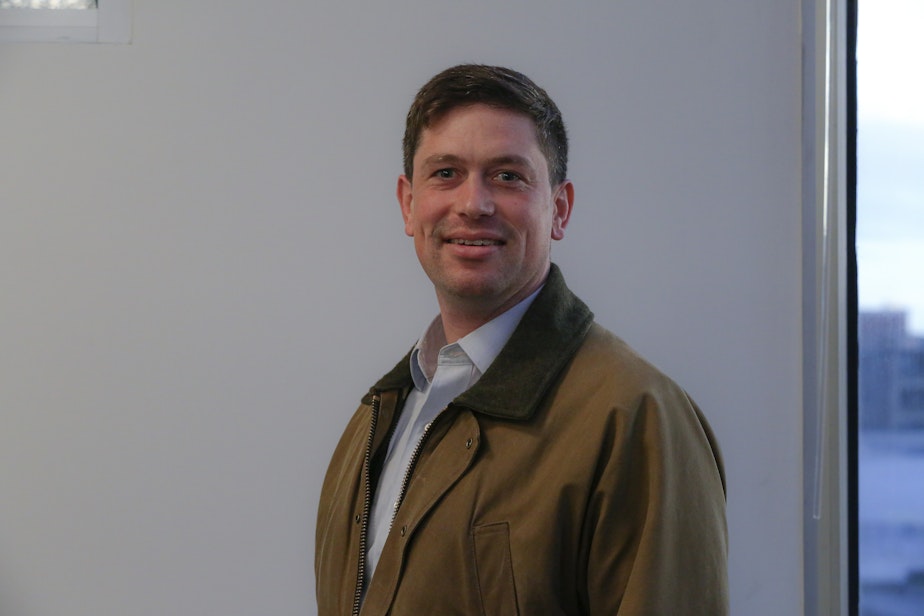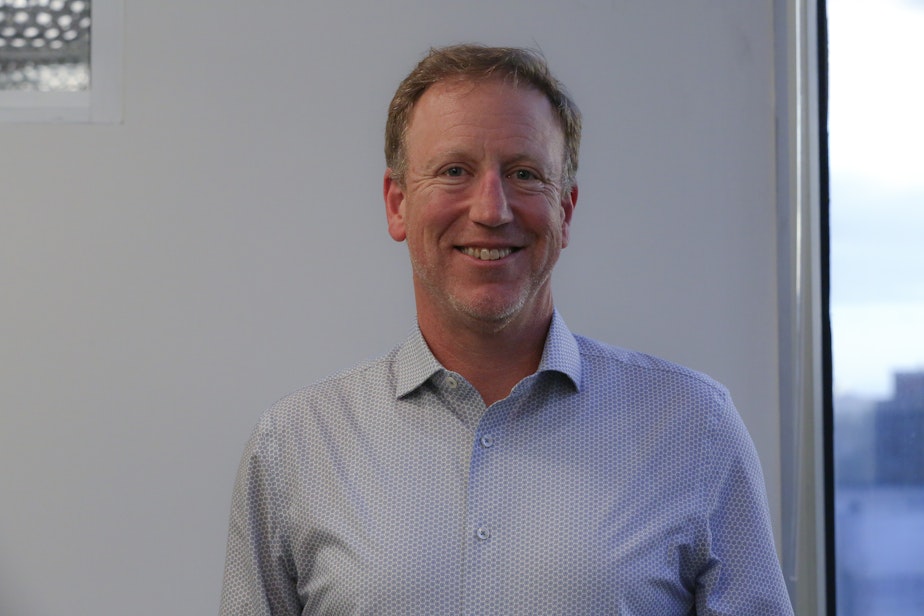With Seattle homicides at record high, defund 'flip-flop' haunts City Council incumbent Dan Strauss

Seattle City Councilmember Dan Strauss is running for reelection this year. And his opponent, Fremont Chamber of Commerce Director Pete Hanning, is trying to paint him as a flip-flopper unworthy of the seat.
The two are running in District 6, which runs from Phinney Ridge through Fremont and Ballard into West Magnolia.
KUOW invited Strauss and Hanning into our studios for a candidate event this week. During the forum, Hanning slammed Strauss for changing his tune on issues including defunding the police, something Strauss pushed back on.
“This flip-flopping has not done our city really good,” Hanning said.
Hanning has been a critic of Strauss and the City Council’s support back in 2020 to explore cutting the police budget by 50%. Hanning says that rhetoric contributed to the high attrition rate of police officers in Seattle.
Since 2020, the city is down hundreds of cops and has been unable to replace many of them with new recruits. To be clear, the council never followed through on promises to defund the police by anything close to 50%.
This year Strauss has been distancing himself from defund rhetoric. Before the primary, he issued a campaign flyer that said defund the police was “a mistake.”
Sponsored
At KUOW’s candidate forum this week, Strauss clarified his position further: “In 2020, I said we have to define how cuts occur to the police department, because I did not believe blunt cuts were the answer that some of my council colleagues thought were the answer.”
Strauss said he’s the best choice to improve public safety, based on his track record on council.
“It was my amendment last year that fully funded the police recruitment plan because we need to be able to hire as many officers as we can," Strauss said. "I fully funded the hiring plan as well.”

Violent crime has emerged as a top issue for Seattle voters this year. While the homicide rate is dropping in other major U.S. cities, the opposite is true in Seattle, with over 65 homicides so far this year. Last week, another shooting death near Golden Gardens in District 6 added to the grim statistic.
Sponsored
Strauss points to his support for the use of mobile police precincts, which are being sent out this week in response to reports of armed robberies near Ballard High and Whitman Middle School.
Strauss is one of the only City Council candidates this year who told KUOW they would spend “significantly more” on Seattle’s police budget. Hanning, his opponent, said the current level of police budgeting is about right.
Still, Hanning has made hiring more police and improving the City Council’s relationship to officers the centerpiece of his campaign. And at KUOW’s live event, he managed to sound even more pro-cop than Strauss at times.
Hanning floated a plan to let police take their patrol cars home, for example, saying it could help lower police response times and improve morale.
“One of the things I'm really passionate about is taking a look at incentivizing those officers who have spent years on the force,” Hanning said.
Sponsored

The candidates were also asked how they would work to hold police more accountable, given a history of racially biased policing and continuing reports of cultural problems at SPD, like one earlier this year about the discovery of a mock tombstone for a Black man killed by police, which was displayed in a police precinct break room.
Again, Hanning spoke mostly about supporting police.
“I think we should also acknowledge that our police department has made a lot of changes, and we should always be working on getting ourselves better,” he said.
For his part, Strauss said he’s currently serving on the council committee that’s negotiating with the police over their next union contract, and implied he hopes to see greater accountability measures, as well as higher pay in the final document.
Sponsored
But beyond their differences, both candidates’ responses marked a shift to the center in city politics this year on public safety issues compared to 2021, when two of the four candidates running for citywide office were self-described police abolitionists.
Both Strauss and Hanning told KUOW they agree with Mayor Harrell’s goal of hiring hundreds of new Seattle police in the next few years to reach a goal of 1,450 trained and deployable officers. And both are also full-throated supporters of a recent city ordinance that makes public drug use and possession prosecutable under city law.
Another difference emerged around the issue of homeless encampment removals. Both candidates support Harrell’s policy of removing encampments, but they differ on how quickly removals should occur.
Hanning criticized the slow pace of encampment removals in the district, including a location on Leary Way, for example, which he says poses a public safety threat to area businesses and residents.
“It has been a long time, and we have to recognize that there is just a level of frustration. And we are not seeing that anything really changes along that corridor," he said. "All we see is that people move from blockfront to blockfront.”
Sponsored
For his part, Strauss said it takes time to get people offers of services and emergency shelters such as tiny homes.
“We can move as quickly as we have shelter available," he said. "During that time, we have to expand shelter availability so we can move into that surge at the end.”
One of the biggest differences at the event was over how to fill a more than $200 million-a-year budget gap the city is anticipating.
Strauss said taxes are the best way to address the problem, and that he would consider expanding the city’s progressive Jumpstart tax on big business to help close the gap.
Hanning said, in talking about raising taxes now before making any budget cuts, the City Council is putting the cart before the horse.
“A budget really is reflective of the council and where they put their resources," Hanning said. "And you guys have overspent and that's why we're looking at a hole in a couple of years."
Hanning said he would even consider a moratorium on the Jumpstart business tax, which is earmarked to fund affordable housing and services to help homeless people.






